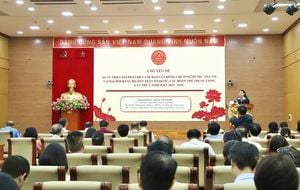Tech entrepreneur Bryan Johnson, recognized for his ambitious ventures aimed at reversing biological aging, has made headlines once more with his latest anti-aging experiment. This time, he has completely transitioned from injecting his son’s blood to utilizing Total Plasma Exchange (TPE) therapy, which he asserts is more effective for rejuvenation.
On his social media account, Johnson declared, "I am no longer injecting my son’s blood. I’ve upgraded to something else: total plasma exchange. Here’s my bag of plasma. Who wants it?" This bold statement highlights his continuous pursuit of groundbreaking methods to extend lifespan and combat the effects of aging.
Total Plasma Exchange therapy involves extracting all blood from the body, separating the plasma, and replacing it with solutions like 5% albumin and intravenous immunoglobulin (IVIG). Johnson explains the benefits of this therapy, stating it helps eliminate toxins, misfolded proteins, and other age-related culprits. He asserts TPE may significantly delay and even reverse age-related ailments, including dementia.
Yet, Johnson’s foray isn’t without its share of scrutiny. Medical experts have noted the necessity for thorough investigations to assess the full potential and risks associated with such unconventional therapies. Dr. Palleti Siva Karthik Reddy, consultant internal medicine at Koshys Hospitals, elaborates on the mechanisms by which TPE may reduce biological age—primarily by lowering systemic inflammation, which often contributes to cellular damage. He notes, "By removing pro-inflammatory cytokines, TPE may help restore a more youthful immune profile." Nevertheless, he emphasizes the need for more research to validate these claims.
Johnson’s previous ventures included the controversial use of rapamycin, originally developed as an immunosuppressant for organ transplant patients. He took it for nearly five years, believing it to have significant longevity benefits. Unfortunately, he reported adverse side effects, including skin infections and abnormal lipid levels, leading to his decision to discontinue the drug. He shared on social media the conclusion his team reached: the potential risks of lifelong rapamycin use outweighed the benefits.
"Despite immense potential from preclinical trials, my team and I concluded the benefits of lifelong rapamycin use do not justify its hefty side effects," Johnson stated. His seasoned experimentation included various dosing schedules, yet he noted recent studies suggested the drug may have accelerated biological aging instead of reversing it.
The impending release of the Netflix documentary 'Don't Die: The Man Who Wants to Live Forever' amplifies public interest. The film chronicles Johnson's relentless quest for immortality, showcasing his extreme methods, from plasma transfusions to extensive supplementation and unique therapies.
Johnson's dedicated routine reportedly costs upwards of $2 million annually to maintain and has sparked widespread debate among health experts. Critics argue against the credibility of some of his methods, pointing out the lack of scientific rigor behind many of his claims. Dr. Matt Kaeberlein, professor of pathology at the University of Washington, stresses the importance of clinical trials for establishing the efficacy of such treatments and cautions against blindly following unverified protocols.
Johnson's recent decision to abandon plasma injections and rapamycin raises pressing questions about the sustainability and safety of his practices. Reports indicate he has also engaged with other experimental interventions, demonstrating his unwavering commitment to longevity research. His headline-making decision to utilize TPE therapy has reignited conversations about the efficacy and morality of biohacking.
While numerous individuals and practitioners share Johnson's fascination with radical health regimes, experts within the medical community repeatedly warn about the potential hazards of such extreme approaches. Dr. Reddy raised several concerns, including the depletion of beneficial proteins and electrolytes, leading to physiological imbalances with frequent TPE use.
He remarked, "IVIG serves to replenish these immunoglobulins, thereby supporting immune function." Although IVIG may prove beneficial alongside TPE, doctors alert potential risks, including cardiovascular strains and allergic reactions. They stress the significance of comprehensive evaluation and constant oversight for individuals embarking on such paths.
Despite the controversies surrounding his methods, Johnson remains undeterred. He continually expresses his hopes of not merely slowing aging processes but seeking to render death unnecessary. This aspiration is evident from his numerous interviews, where he addresses the backlash he receives for his unconventional methods.
The results of his methods remain to be seen, yet Johnson’s dedication to the anti-aging cause has undoubtedly stirred both intrigue and criticism within the health community. Experts call for evidence-based approaches rather than experimental, self-directed trials, advocating for medically supervised interventions.
While Bryan Johnson’s anti-aging experiments continue to draw attention, they also highlight the broader societal quest for eternal youth and the ethical dilemmas therein. Can science genuinely help us defy aging, or do the lengths to which some are willing to go raise significant concerns about the essence of health and mortality?



